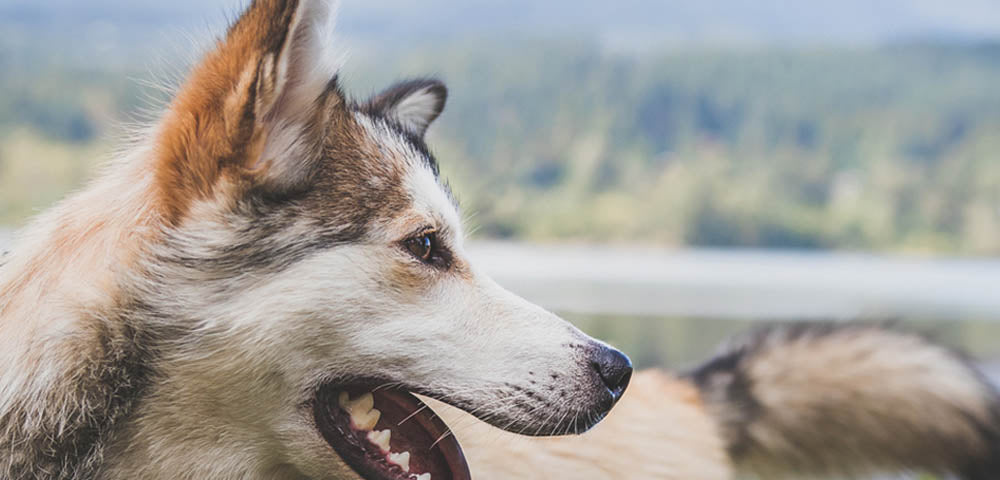Just like humans, dogs undergo several physical health changes as they age. From slowing metabolism and a compromised immune system to gaining weight, such changes can creep up on you and your canine companion faster than either of you realize. To help your graying pooch stay happy and healthy for as long as possible, you've got to do your part to take care of its well-being, such as including senior dog supplements in its daily diet. Waggedy is here to help educate you with a few excellent health and nutrition tips you can put to good use.
See how you can teach your old dog a few new health tricks!

Boost Brain Power
Touching back on cognitive function for a moment, look into omega-3 fatty acids to keep your dog's brain sharp. You may already be familiar with conventional sources of such acids, such as algae oil, fish oil, and krill oil.
There are also botanical oils that can help with canine cognitive health. The oils help fortify your pet's awareness, learning and decision-making abilities, and overall memory. The reason senior dogs need such oils is that at about at age seven, their brains struggle to use glucose as their primary source of energy, which causes a decrease in cognitive functioning. By introducing botanical oils into your aging dog's diet, you give them another source of brain food. Check with your veterinarian before adding supplemental oils of any kind to your dog's diet.
Anticipate Common Senior Dog Issues
Some health issues are somewhat common with dogs of advanced age. For instance, older dogs commonly experience hip and joint pain. There are nutritional supplements you can buy for specific joint issues, such as our Anti-Inflammatory Hip & Joint w/ Turmeric supplement. Combining this with Daily Essentials Senior helps address hip and joint pain, plus the tablet also gives your senior dog an energy boost, improves the look and feel of its coat, and addresses digestive health.
Besides a supplement, making an effort to keep your dog physically active also helps to keep joint pain under control. Water exercises can be especially beneficial and enjoyable for older dogs who aren't as spry as they used to be.
Ensure Your Dog Gets Plenty of Protein
While your dog required a regular amount of protein through adulthood, it will need more of it later in life. While shopping for high-quality protein, make sure it's easily digestible and has a high moisture content. This is because your dog's organs age right along with the rest of its body, which means that your dog may not be able to digest food as easily as it once could; a bit of help goes a long way in making both your lives more comfortable.
Make a Note of Shifting Behavior
Has your senior dog been acting differently lately? If so, it's possible this shift is a symptom of a disease. For instance, dogs that don't drink or eat as much as they used to could have an underlying health issue. The same is true of changes in bowel, urinary and sleeping habits. Maybe your dog has become uncharacteristically irritable and snappy lately. If so, they could be in pain, have decreased eyesight, or have trouble hearing. No matter how minor a change may seem, it's best to let your veterinarian know. It could be nothing, or it may be something that needs addressing.
Help Your Dog Remain Mobile
Just as older humans may not be able to move and navigate like they used to, the same is true of aging dogs. Arthritis can make it hard for older pups to remain as active as they may like to be, so that they may need some help. Stairs and ramps can make a world of difference and keep your dog moving and staying healthy. If you have hardwood or otherwise slippery floors in your home, consider putting down rugs or carpet to give your pooch some traction. And if you like to take your dog places, you may have to lift him or her into and out of the car.
Give Your Dog Chances to Socialize & Play
No matter their age, most dogs love to be social. If there's a dog park in your area, or if your neighbors have dogs, seek out opportunities for your dog to visit their four-legged friends. The reason it's so essential for aging dogs remain social is to stave off confusion and fear. That said, it's best to give your dog a proper balance of interaction with other dogs. This is because dogs can quickly become overwhelmed and overstimulated when there's too much information for them to process. Pay close attention to how your dog reacts to everything so that you can quickly spot when it's time to call it a day and head home.
Even when you and your dog aren't out and about, you can make an effort to keep her or him mentally engaged. Any playtime or attention is a great way to keep your dog from becoming anxious, which is another common problem with senior dogs. Create and stick to a daily routine to address any uncertainty your dog may have. Puzzles with food or treat rewards can also be enjoyable and mental stimulating for dogs.
Make Sleeping as Comfortable as Possible
A good night's sleep can make all the difference in the world. For that reason, we recommend that you lay down lots of towels and blankets on your aging dog's bed. If you know for a fact that your dog has joint issues, there are unique beds that are made with denser materials to support aging joints. There are even heated and vibrating beds, which are great for reducing stiffness and stimulating your dog's circulation.
Let Your Vet Get to Know You and Your Dog
As you can see, it's vital to include a qualified vet in your dog's life, no matter how young or old your dog is. When it comes to older dogs, it's best that they take a trip to the vet at least twice a year. Just like with your physical health or your car’s maintenance schedule, making regular visits to the vet can alert you of minor health issues before they become major issues.

Maintain Proper Dental Health
Dogs can experience dental problems as they age, which is why it is recommended that you try to brush your dog's teeth at least once a day. Talk to your vet to see how often you should look into having your dog's teeth professionally cleaned for optimum oral health.
One thing worth mentioning when it comes to taking good care of a dog's teeth is they may have to be placed under anesthesia for thoroughly cleaned teeth. If they aren't, they're unlikely to sit still enough for their gums to be fully cleaned, and it's the gums that are often the root cause of dental issues with dogs. Know that modern anesthesia and monitoring equipment have made it so that dogs can be anesthetized without harmful side effects. In any case, it's best to do some research on the grooming shop or veterinarian that will be cleaning your dog's teeth.
Add Antioxidants and Senior Dog Supplements
Humans aren't the only ones who can benefit from getting plenty of antioxidants in their daily diet. For aging dogs, antioxidants help with cognitive function and memory, helping them fend off the canine version of Alzheimer's. Some of the best sources of these essential antioxidants are blueberries, apples, raspberries, and blackberries.
On a related note, you can also consider adding supplements to your dog's diet. Specifically, look into adding Vitamin C and Vitamin E to meals. With both antioxidants and supplements, check with your veterinarian to see which sources are best suited for your pup's health and breed. You want tailored recommendations from your vet so you can use these senior dog health tips the best way possible.
It may seem like a massive undertaking to take proper care of your senior dog, but it's best to take things one step at a time. Talk these tips over with your vet to see if there's anything you may need to modify for your specific dog or breed. Be sure to check out our full line of products to keep your dog's tail wagging. And don't hesitate to contact us if you have any questions.






